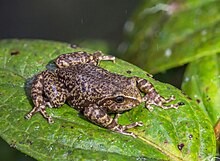Pristimantis is a very large genus of frogs distributed in the southern Caribbean islands (Lesser Antilles) and in Central and South America from Honduras to northern Argentina and southern Brazil.[1] With 596 described species (as of October 2022), the genus had more species than any other genus of vertebrate animals.[2] Many of these species genus are endemic to the Northwestern Andean montane forests ecoregion in north-western South America.[3]
| Pristimantis | |
|---|---|

| |
| P. elegans, Colombia | |
| Scientific classification | |
| Domain: | Eukaryota |
| Kingdom: | Animalia |
| Phylum: | Chordata |
| Class: | Amphibia |
| Order: | Anura |
| Family: | Strabomantidae |
| Subfamily: | Pristimantinae |
| Genus: | Pristimantis Jiménez de la Espada, 1870[1] |
| Diversity | |
| About 596 species, see list | |
Etymology
editFrom the greek πριστις, serrated and μαντις, arboreal frog.[4]
Taxonomy
editPlacement of this genus has varied greatly. Pristimantis was long included in the massive genus Eleutherodactylus, and considered part of the family Leptodactylidae. Currently, the genus is placed placing in the family Strabomantidae, subfamily Strabomantinae,[2][5][1]
Species
editAs of October 2022, there are 592 species, but new ones continue to be described on a regular basis (e.g.,[6][7][8][9][10]):[1]
Notes
edit- ^ a b c d Frost, Darrel R. (2022). "Pristimantis Jiménez de la Espada, 1870". Amphibian Species of the World: An Online Reference. Version 6.1. American Museum of Natural History. doi:10.5531/db.vz.0001. Retrieved 17 October 2022.
- ^ a b "Strabomantidae". AmphibiaWeb: Information on amphibian biology and conservation. [web application]. Berkeley, California: AmphibiaWeb. 2014. Retrieved 27 December 2014.
- ^ C. Michael Hogan & World Wildlife Fund. 2012. Northwestern Andean montane forests. ed. P.Saundry. Encyclopedia of Earth. National Council for Science and the Environment. Washington DC
- ^ Jiménez de la Espada, M. (1870). "Fauna neotropicalis species quaedam nondum cognitae". Jornal de Sciências, Mathemáticas, Physicas e Naturaes. Lisboa (3): 57–65.
- ^ Blackburn, D.C.; Wake, D.B. (2011). "Class Amphibia Gray, 1825. In: Zhang, Z.-Q. (Ed.) Animal biodiversity: An outline of higher-level classification and survey of taxonomic richness" (PDF). Zootaxa. 3148: 39–55. doi:10.11646/zootaxa.3148.1.8.
- ^ Reyes-Puig, Carolina; Reyes-Puig, Juan Pablo; Velarde-Garcéz, Daniel A.; Dávalos, Nicolás; et al. (2019). "A new species of terrestrial frog Pristimantis (Strabomantidae) from the upper basin of the Pastaza River, Ecuador". ZooKeys (832): 113–133. Bibcode:2019ZooK..832..113R. doi:10.3897/zookeys.832.30874. PMC 6435602. PMID 30930648.
- ^ Székely, Paul; Eguiguren, Juan Sebastián; Ordóñez-Delgado, Leonardo; Armijos-Ojeda, Diego; Székely, Diana (10 September 2020). "Fifty years after: A taxonomic revision of the amphibian species from the Ecuadorian biodiversity hotspot Abra de Zamora, with description of two new Pristimantis species". PLOS ONE. 15 (9): e0238306. Bibcode:2020PLoSO..1538306S. doi:10.1371/journal.pone.0238306. PMC 7482940. PMID 32911497.
- ^ Edgar Lehr, Shenyu Lyu and Alessandro Catenazzi. 2021. A New, Critically Endangered Species of Pristimantis (Amphibia: Anura: Strabomantidae) from A Mining Area in the Cordillera Occidental of northern Peru (Región Cajamarca). Salamandra. 57(1); 15-26.
- ^ Sánchez-Nivicela, Juan C.; Urgiles, Verónica L.; Cedeño-Palacios, Jhonny; Abad-Peñafiel, Homero; Guayasamin, Juan M. (1 January 2020). "Una fantástica nueva especie del grupo Pristimantis orcesi de los Andes sur de Ecuador". Neotropical Biodiversity. 6 (1): 224–237. Bibcode:2020NeBio...6..224S. doi:10.1080/23766808.2020.1869449.
- ^ Brito-Zapata, David; Reyes-Puig, Carolina (2021). "A new species of terrestrial-breeding frog Pristimantis (Anura: Strabomantidae) from the Cordillera del Cóndor, Zamora Chinchipe, Ecuador". Neotropical Biodiversity. 7 (1): 213–222. Bibcode:2021NeBio...7..213B. doi:10.1080/23766808.2021.1940048.
References
edit- P.J.R. Kok, Means, D.B., & Bossuyt, F. (2011). "A new highland species of Pristimantis Jimenez de la Espada, 1871 (Anura: Strabomantidae) from the Pantepui region, northern South America." Zootaxa 2934: 1–19.
- T. Orrell. (custodian) (2012). ITIS Global: The Integrated Taxonomic Information System (version April 2011). In: Species 2000 & ITIS Catalogue of Life, 25 June 2012 (Bisby F., Roskov Y., Culham A., Orrell T., Nicolson D., Paglinawan L., Bailly N., Kirk P., Bourgoin T., Baillargeon G., eds). Digital resource at www.catalogueoflife.org/col/. Species 2000: Reading, UK.